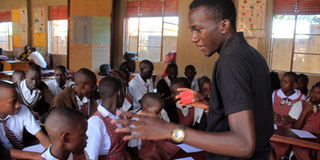Growing up without a father pushed him to inspire others

Kalule speaks to students. Face Up Uganda offers mentorship to the youth. PHOTOS BY EDGAR BATTE
What you need to know:
- From their community interaction, findings show that elders do not easily associate with the young generation, which leaves most youth a risk and left to be condemned by the same elders.
- The organization is composed of young people between 10 and 20 years.
Emmanuel Kalule was raised by a single mother and for that he has never known a father figure in his life.
At nine years, he started the struggle to find a proper role model that later introduced him to other youth with similar frustrations.
At 16 years, he would spend much of his weekends with youth in different communities, especially ghettos, where he would share experiences. And it is this that perhaps gave him the build to grow into a useful young man.
His lifestyle, together with his social life and education, gave him an opportunity to curve himself out as a link between the young and the old. At university he pursued Art, which allowed him the legroom to share with young people, most of whom where his age. He would also use football to socialise.
“I realised I had a number of talents which I was almost very good at all. I used to play soccer, dance and art. I was confused on which I needed to concentrate on,” he says.
However, he took keen interest in football, which earned him his first trip out of Uganda.
In 2013, Kalule, for the first time, travelled to Sweden, Denmark and Norway to participate in football tournaments.
He was part of the Kampala Junior Team and after he had arrived in Sweden, he sought an opportunity as a professional footballer with Guis FF, a Swedish football team. “I was not selected and I got so disappointed. This reduced my interest in soccer. When I returned, joined university to pursue a degree in Industrial and Fine Art, which I was more passionate about. From then on, I concentrated on the art,” he recounts.
Start of journey
In 2016, Kalule graduated and his major focus was to establish an organisation through which he would empower young people by using arts.
The organisations - Faces Up Uganda – started as a non-governmental organisation with the intention of creating a link between young people and role models who inspire them into making choices in life.
Indeed he has had an opportunity to line up some speakers who have given youth some inspiration.
Some of them include football stars such as Farouk Miya and Denis Oyango, fashion designer Sylvia Owori, Katikiiro Charles Peter Mayiga, Speaker of Parliament Rebecca Kadaga and artist Xenson Ssenkaba. “The different individuals have shared their stories and experiences which has greatly impacted on the lives of young people,” Kalule says.
The organization is composed of young people between 10 and 20 years. The topics of discussion usually rotate around passion and talent as well as how young people can handle their talents to benefit from them.
A lot more is covered through the different community engagements with young people getting hands-on training where they get skills to produce some items.
For one to become a mentor, they have to be interested in giving hand-ups to others, knowledgeable, willing to create time, undergo a training of trainers with the team of the organisation.
Evident growth
Currently, according to Kalule, Face Up Uganda has about 15 young people, who work as volunteers.
Face Up Uganda has a number of activities most of which are publicised through social media platforms.
The young people also interview and writes stories from different people that are used to inspire others.
According to Kalule, Face Up Uganda, as an organisation has severally been invited by different companies to provide mentorship.
“Most of the young people are not prepared enough to thrive on their own. You realise that a number of them have big ideas but not empowered enough to go about them. Many are affected and carry on the copy and paste mind-set. Youth today would wish to apply a full movie they watch on television directly into their lives without cautioning,” he says.
In effect, the generation dividend is a great challenge a number of youth face largely due to the nature of the societies in which they are raised.
The disconnect
From their community interaction, findings show that elders do not easily associate with the young generation, which leaves most youth a risk and left to be condemned by the same elders.
Many have become materialism because they get drawn towards physical gains like gifts or money.
To Kalule, the root cause of materialism, are the places and homes where the young people hail from.
That is on addition trends society has created and carried on, for example if a child is to be encouraged, they are promised a reward.
“Young people grow up with that mentality to an extent that even when you are teaching them something beneficial, they need you to first gift them so that they learn it. Therefore when such people meet in the context of a youth population, the effect is felt at a bigger scale.”
That has some dangers especially where gifts could come from selfishly motivated individuals. The solution lies in boosting young people’s self-esteem.
“When you boost their esteem, it helps foster their confidence in their own ideas, helps them in capacity-building, improves their resilience and above all prepares them to thrive in their lives.”




